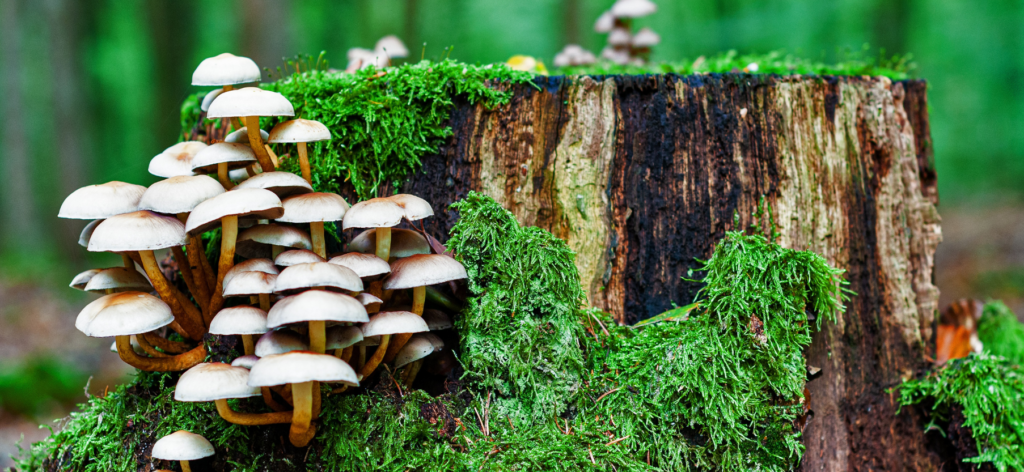If you’re at all interested in health and wellness, you’ve almost certainly heard the term “adaptogen”, and probably have some questions: what are adaptogens? What do they do? And how can you benefit from them? In this article, we’ll explore all of that, along with some examples of popular adaptogenic herbs and supplements, and the best ways to introduce them to your diet.
What is an adaptogen?
First things first. Put plainly, adaptogens are plants that help the body adapt to stress.
The term “adaptogen” was first coined in 1947 by the Russian scientist Nikolaĭ Lazarev. He defined an adaptogen as any natural compound that helps the body cope with stress. In a biological context, “stress” is a specific term referring to anything that knocks the body out of its normal state of functioning.
Prof. Lazarev’s concept was refined by Dr. Isreal Brekhman in the 1960s, who studied adaptogenic herbs including Siberian and Asian ginseng. He stated that any adaptogen should have three key features. To be considered an adaptogen, a plant must:
- Be almost non-toxic, meaning that they don’t cause harm when taken at the recommended dose
- Normalize bodily systems, supporting the body’s natural ability to return them to their non-stressed state
- Have a non-specific effect, which means they support multiple biological systems, increasing resistance to a variety of external factors
Common in Ayurvedic and Traditional Chinese Medicine, these plants have become increasingly popular in recent years due to their ability to aid with physical, mental and emotional health.
RECAP: Adaptogens are substances that are meant to help the body cope with physical, emotional and environmental stressors. They work by supporting the HPA axis.
Adaptogens vs. Stimulants
What is the difference between adaptogens and stimulants?
Since adaptogens work to normalize the body’s stress responses, they can have knock-on effects on things like performance and cognition, which are negatively impacted by chronic stress. Because of this, you’ll often see adaptogen-containing products marketed as performance enhancers. This begs the question: what is the difference between adaptogens and stimulants?
The key difference between adaptogens and stimulants is how long their effects last. Stimulants like nicotine and caffeine have fast-acting but temporary effects, typically followed by a drop in capacity. And as any frequent coffee drinker knows, the more you consume, the more you may feel you need.
Adaptogens don’t work instantly. Their benefits require consistent use over time, but what they may lack in immediate relief they make up for in overall effect. Adaptogens have long-lasting effects that are not followed by a drop in capacity; they don’t create the same peaks and troughs that stimulants do.
Rather than masking the symptoms of chronic stress, adaptogenic herbs work to enhance the body’s natural ability to adapt to it.
Adaptogens vs. Nootropics
What’s the difference between adaptogens and nootropics?
Adaptogen herbs have sometimes been grouped with nootropics, substances purported to enhance cognition and mental performance. The two do share similarities: both adaptogens and nootropics can help balance the body’s stress response, leading to improved cognitive function. The terms are not necessarily mutually exclusive; some herbs may be classified as both an adaptogen and a nootropic.
That said, the primary focus of an adaptogen is on its ability to reduce stress. Adaptogenic supplements work to counteract the effects of long-term stress on the body’s systems. Nootropic supplements are intended to offer a more immediate cognitive boost.
RECAP: Stimulants and Nootropics provide quick, temporary effects followed by a drop in capacity. Adaptogens are slower to act, but create long-lasting effects without a crash.
The science supporting adaptogens
Are adaptogens supported by science?
Unlike treatments for specific diseases, adaptogens are touted as having a general ability to fortify us against challenges to our health. This makes them trickier to study.
The first challenge is one of classification: what makes a plant an adaptogen? As it turns out, this is harder to define than you’d think. Take ashwagandha, for example. Ashwagandha is one of the better-known adaptogens, and its effects on modulating stress response have been well studied.
Clinical studies show that ashwagandha affects the release of cortisol, and can help moderate adrenal activity. But ashwagandha has also demonstrated an ability to reduce inflammation. So does that make it an adaptogen? An anti-inflammatory? Both? Categorization challenges like this are something researchers are working to resolve.
The second challenge with research is the fact that, by definition, adaptogens have a general vs. specific effect. Our stress responses are complicated and involve many different systems and processes. This makes it very challenging to pinpoint how exactly any specific substance is affecting the system overall.
To date, most studies on adaptogens have been conducted in animals or on cells grown in a lab. While these tests are of great value to our understanding, it’s difficult to generalize effects seen in cells or animals to human beings. So while research has demonstrated correlations between adaptogenic plants and overall decreases in stress, more research is needed to determine how exactly it works.
Are mushrooms adaptogens?

Most of our knowledge of adaptogens comes from studying plants. Whether it’s a fear of fungi, or what author Merlin Sheldrake calls a “plant-centrist” perspective, little attention has been given to investigating useful applications of fungi relative to their plant cousins. A study of patent applications published in 2020 found that 6.2% of all plant species are represented in patents, compared to less than 0.4% of fungi. So although commercializing natural products is a controversial topic, these numbers do give a sense of how much we have yet to explore when it comes to mushrooms.
That said, mushrooms are known to contain some of the same compounds as adaptogenic plants. Reishi and cordyceps have both been studied for their benefits on stress-related fatigue, while chaga is known to contain antioxidants that may help protect cells from damage due to oxidative stress. As such, although there is limited research specific to mushrooms as adaptogens, it stands to reason that they should be considered alongside traditional plant-based adaptogens.
Is cannabis an adaptogen?
Many people turn to cannabinoids to help ease anxiety and stress, which begs the question: does this make cannabis adaptogenic as well? Not really. While cannabis does have many beneficial effects, it is not typically considered to be an adaptogen itself. That said, similar to the conversation about medicinal mushrooms, there is overlap between the effects of cannabis and adaptogenic plants and herbs.
It’s fairly well established that CBD can reduce cortisol levels, lessening feelings of stress and anxiety. It is also linked to improved sleep quality and duration for people with insomnia. THC’s ability to reduce inflammation and assist in pain management are also reminiscent of the effect adaptogens have; after all, reduced pain is certainly associated with lower overall stress.
And then there’s the concept of functional cannabis, an approach plant healing that combines cannabis with adaptogens and functional mushrooms in a bid to enhance each plant’s individual therapeutic benefit.
So while cannabis isn’t an adaptogen in the strictest sense, it is at the very least adaptogen-adjacent.
Popular adaptogens
There are many plants that could be classified as adaptogens, however, a few have become popular for their known benefits. Some of the most popular adaptogenic herbs include Ashwagandha, Schisandra, Rhodiola Rosea, Holy Basil, and Astragalus.
Ashwagandha
Ashwagandha is an herb from South Asia with a long history of use in Ayurvedic medicine. It has been used to reduce anxiety and stress, help boost brain performance, increase energy levels and reduce inflammation; as well as protect the immune system. Additionally, it reportedly aids in better sleep quality by improving the body’s ability to cope with anxiety. Also known as “Indian ginseng,” ashwagandha is said to be both an adaptogen and a tonic herb – meaning that it can act both to counter fatigue while also strengthening the body’s overall natural health.
Rhodiola Rosea
Also known as “golden root” due to its yellow flowers, Rhodiola Rosea is native to cold climates such as Siberia and Scandinavia. This adaptogenic herb has traditionally been used as a mental booster, helping improve focus and combat fatigue while also promoting physical performance. Rhodiola Rosea can help lower cortisol levels (the hormone responsible for producing feelings of stress or fear), providing an ability to better manage stressful situations. Additionally, studies have suggested that Rhodiola Rosea can potentially improve memory recall in healthy adults.
Schisandra
Schisandra is a berry native to East Asia and has long been used for centuries in traditional Chinese medicine. Its taste is said to be the perfect balance of sweet, sour, salty, spicy and bitter; with all five tastes recognized in traditional Chinese medicine. Schisandra berries are thought to help protect against stress-related illnesses such as depression, anxiety and insomnia; while their antioxidant properties may also offer anti-aging benefits too.
Holy Basil
Holy basil (also known as Tulsi) is an aromatic plant from South Asia with many therapeutic benefits. This adaptogen has traditionally been used to reduce inflammation while relieving stress; as well as protecting the immune system from diseases caused by oxidative stress. Research suggests that Holy basil may even have anti-cancer properties when consumed regularly; this is due in part to its high antioxidant content, which helps protect cells from damage caused by free radicals.
Astragalus
Lastly we have Astragalus – another popular adaptogen originating from Traditional Chinese Medicine practices. Astragalus is reported to have various health benefits ranging from improved energy levels and digestion, boosting cardiovascular functions, and helping relieve fatigue associated with chronic illness or injury recovery periods. Just be sure not to consume this one if you happen your pregnant!
Are adaptogens worth taking?
The natural world is the source of a wide range of useful chemicals, and there is undoubtedly more to discover.
These natural plant-based remedies have been used for centuries, and modern science is now finally beginning to explore their potential benefits. Ultimately, the research in this area is still early; but with more studies being conducted into adaptogens every day, we may soon unlock their full potential in aiding our mental and physical wellbeing. So although there is still much to learn about the potential benefits of adaptogenic herbs, plants, and fungi, it may be worth giving them a try if you’re looking for a non-pharmaceutical way to ease stress and improve your overall health.
That said, quality and ingredient sourcing is definitely something to watch out for. As with all natural health supplements, there is no standardized dosing or testing requirements for adaptogen-containing products. Look for highly reputable brands that are tested for quality control and purity, like the ones we’ve vetted to include in our store.
Finally, remember that adaptogens are naturally occurring substances, so there will be variations in potency from one batch to another; always consult the label instructions when taking them to ensure correct dosage. With responsible use, you may just find yourself reaping the soothing benefits from these ancient herbs.
Shop Vetted Adaptogen Supplements

$35.50

$19.95

$29.95

$21.49

